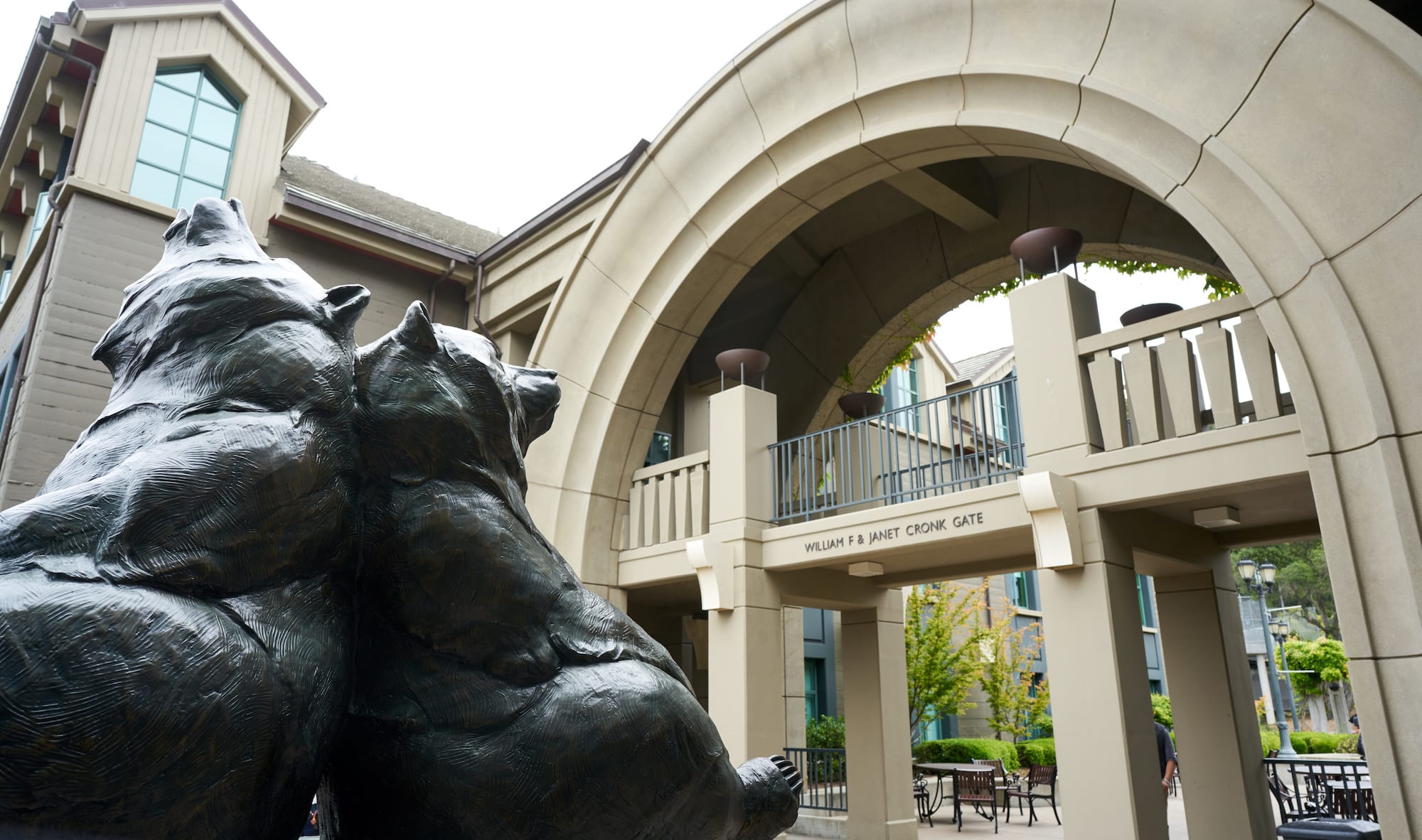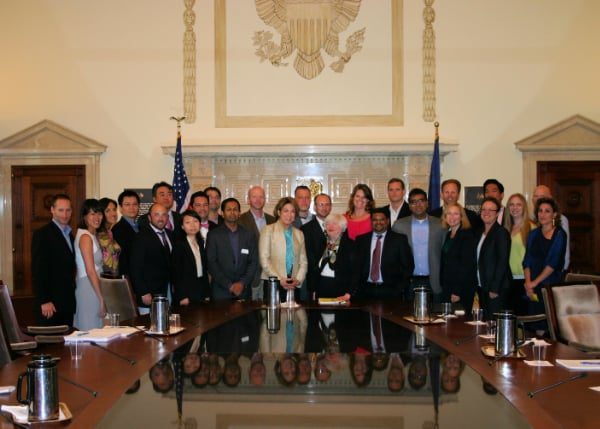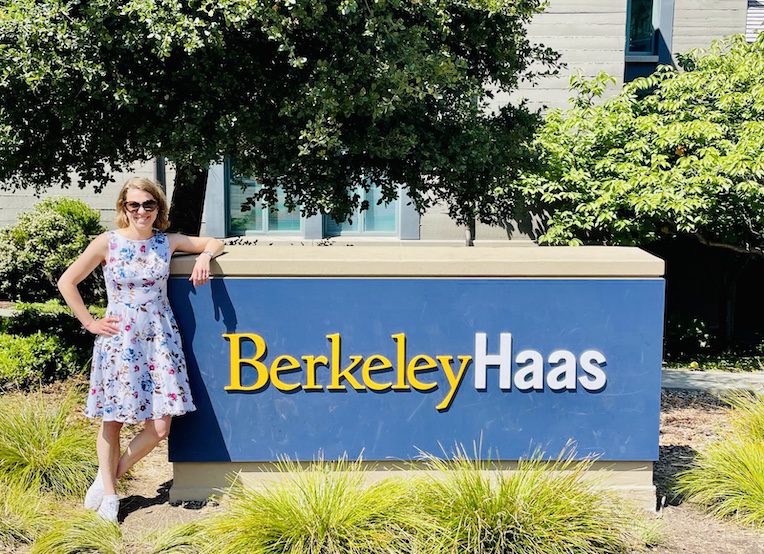Two new professors bring economic expertise in health, labor, and government policy
If ever there was a year that called on all of us to embody the Berkeley Haas Defining Leadership Principles, it was 2020. It so happened that this tumultuous year also marked the 10th anniversary of codifying these principles, which have become deeply embedded throughout our school over the past decade.
This year, many in our community went beyond themselves to help those struggling with pandemic impacts, while others questioned the status quo, speaking out against racial inequities and violence against Blacks and African Americans. Others showed confidence without attitude in sharing expertise and skills to help small businesses or solve other problems related to the pandemic. And we were all reminded to be students always as we adapted to life online.
While 2020 challenged us in many ways, it also taught us that a global pandemic can bring out the best in ourselves and our community, and there is a lot worth recognizing—and even celebrating—as the year comes to a close. Here’s what we’ll remember.
Black Lives Matter

Marco Lindsey, associate director of Diversity, Equity & Inclusion at Haas; Erika Walker, assistant dean of the Haas Undergraduate Program, and Dan Kihanya, MBA 96, shared perspectives with the Haas community following the killing of George Floyd.
As waves of protests swept the country in response to the murder of George Floyd, Breonna Taylor, and Ahmaud Arbery, Haas community members spoke out publicly about violence against Blacks and African Americans, sharing deeply personal narratives of anguish, frustration, and devastation. “If you read no further, understand this,” wrote Marco T. Lindsey, associate director of Diversity, Equity, and Inclusion at Berkeley Haas, in a widely shared letter to the community. ”Black Lives Matter = if anyone kills a Black person, their punishment should be the same as if they killed someone from any other race.” Responding to BLM, students, faculty, and staff rallied together, leaning on each other for support. They raised funds to rebuild damaged Black-owned businesses and for racial equity organizations, and embarked on personal journeys toward allyship through campus study groups, anti-racist challenges for students and staff, and “Ask Me Anything” sessions.
Students stepping up

Lokilani Hunt, (left) Crystal Ang, and Drew Schneider are working to help small businesses through the Berkeley Community Business Partnership.
Among the notable 2020 projects were the Berkeley Community Business Partnership, led by Lokilani Hunt, MBA 22. As president of the group, Hunt led 60 MBA students who worked with local community groups to offer consulting support to small Bay Area businesses. Their work ranged from organizing a worker-owned cooperative for struggling restaurants to developing new financing pipelines for women-owned businesses to helping small grocers build their online presence and upgrade their payment systems. The effort builds on a project launched last spring by the Sustainable and Impact Finance (SAIF) initiative at Berkeley Haas. Meanwhile, Peter Gallager, EWMBA 22, a member of the University Development & Alumni Relations fundraising team, helped raise $10 million in three weeks for a pop-up coronavirus testing lab at the Innovative Genomics Institute. Raising that kind of capital can take months or even years to accomplish in normal times. “I’ve never experienced anything like that, but these are unprecedented times and people are responding in unprecedented ways,” he said.
Janet Yellen nominated for Treasury Secretary
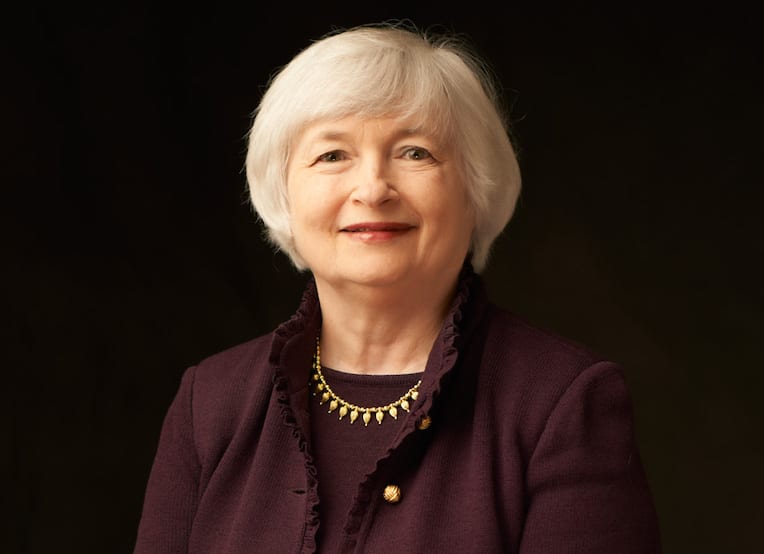
Janet Yellen
Berkeley Haas Prof. Emeritus Janet Yellen’s career has been brilliant, groundbreaking, and defined by a commitment to public service. Among her many accomplishments: She was the first woman to chair the Federal Reserve Board of Governors, she chaired the President’s Council of Economic Advisors, and she taught thousands of Berkeley Haas MBA and undergraduate students from 1980 to 2006. Now poised to become President-elect Biden’s lead economic advisor at one the nation’s most challenging periods, Yellen is expected to be a champion for all those facing the economic devastation of the pandemic.
Former Dean Laura Tyson, professor of the graduate school and her longtime close colleague, told the Financial Times that Yellen is driven by neither the “power” nor the “kudos” of the position. “She is doing it to serve the public, through the tools she has to understand economic issues.”
The passing of faculty greats
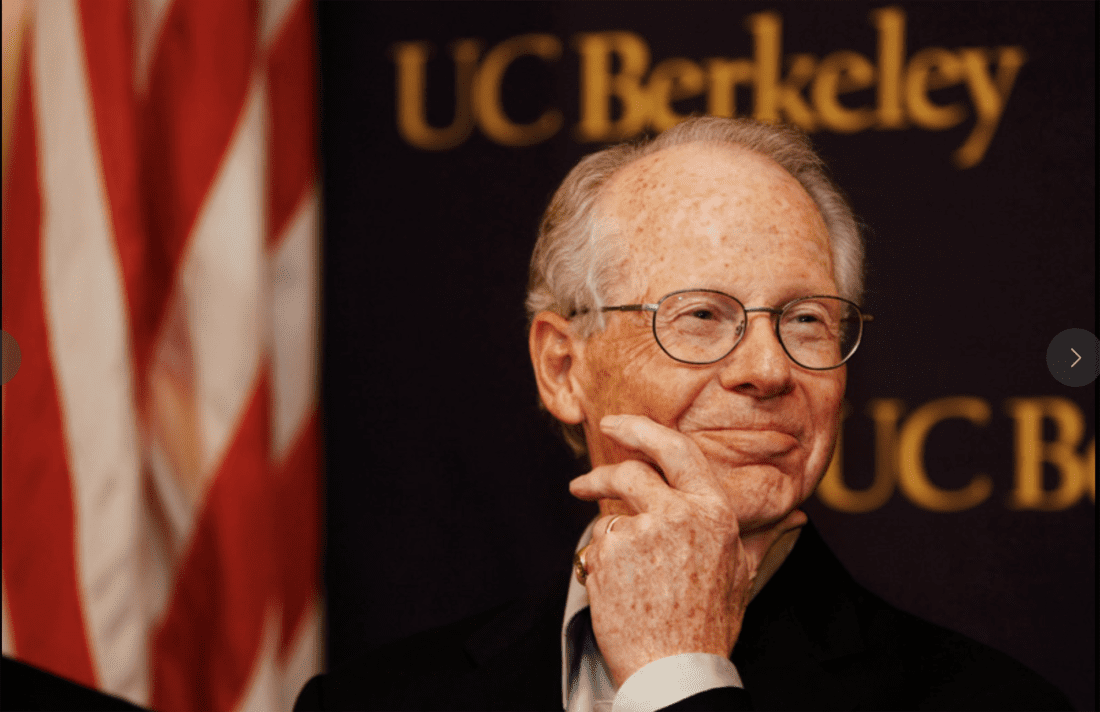
Oliver Williamson at a 2009 Nobel Prize news conference on campus. (AP Photo/Paul Sakuma)
Nobel laureate Oliver Williamson, a pioneer of organizational economics, passed away on May 21 at age 87. Williamson, known to friends and colleagues as Olly, shared the 2009 prize in economics with political scientist Elinor Ostrom of Indiana University for his insight on the “make-or-buy”decision—the process by which businesses choose whether to outsource a process, service, or manufacturing function. “Williamson’s work permanently changed how economists view organizations,” said Prof. Rich Lyons, who was dean when Williamson won the Nobel. “Yet for all of his intellectual creativity, I most often think of Olly as a person who lifts others.”
Last month we also lost Prof. Emeritus George Strauss, who passed away Nov. 27 at age 97. An icon in the field of industrial relations who served as a professor from 1960 until 1991, Strauss helped establish Haas as an organizational theory powerhouse starting in the 1960s. He was a prolific researcher and top scholar of organizational behavior, unions, workplace participation, and comparative industrial relations.
The scramble to move online
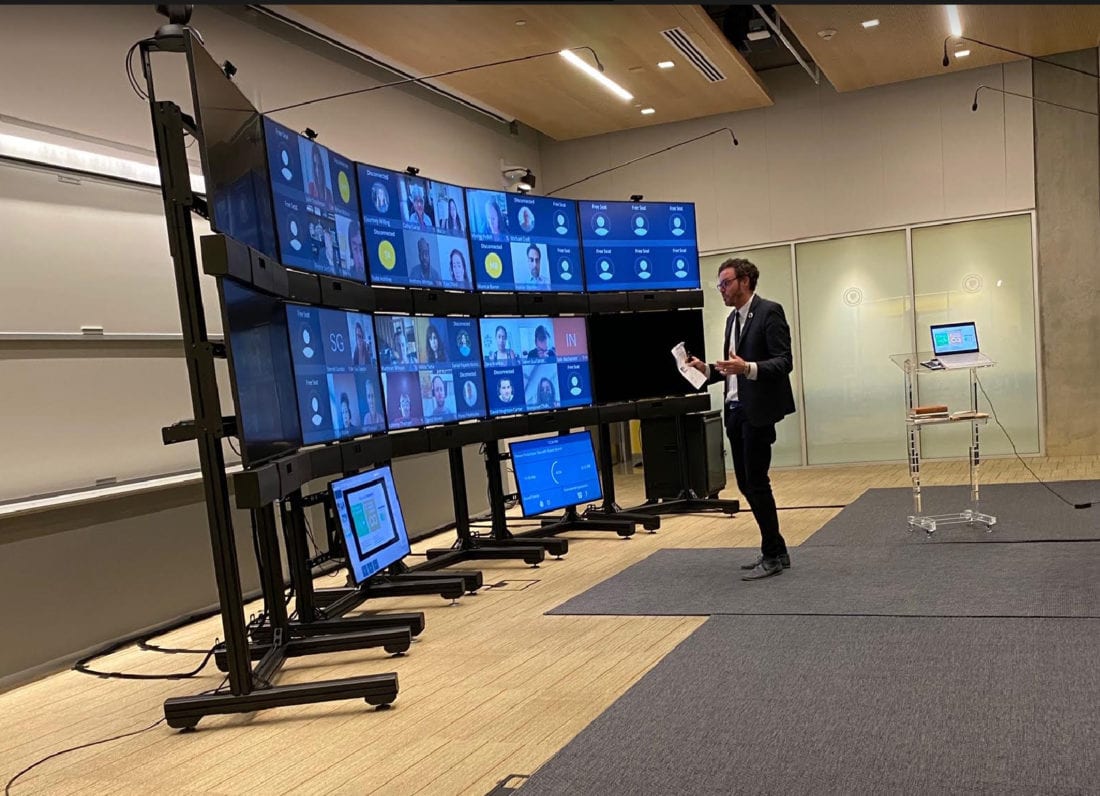
Robert Strand, executive director of the Center for Responsible Business, tries out one of the four new Berkeley Haas virtual classrooms.
On March 9, it was all-hands-on-deck after Chancellor Carol Christ announced the campus would suspend in-person classes to control the spread of the novel coronavirus. Haas had to move 270 classes online virtually overnight. Faculty members scrambled to adapt, with Haas Digital, graduate student instructors, and other staff working overtime to support them. Those with more experience online stepped up to help colleagues. The work continued all summer, as faculty and staff worked to re-imagine classes, learn online pedagogy, and pre-record asynchronous material, while Haas invested in new technology. Dean Ann Harrison commended the efforts. “After watching our faculty and staff move within 36 hours to online teaching when the coronavirus broke out, I believe there’s little that we can’t do virtually going forward.”
Financial creativity to save small businesses
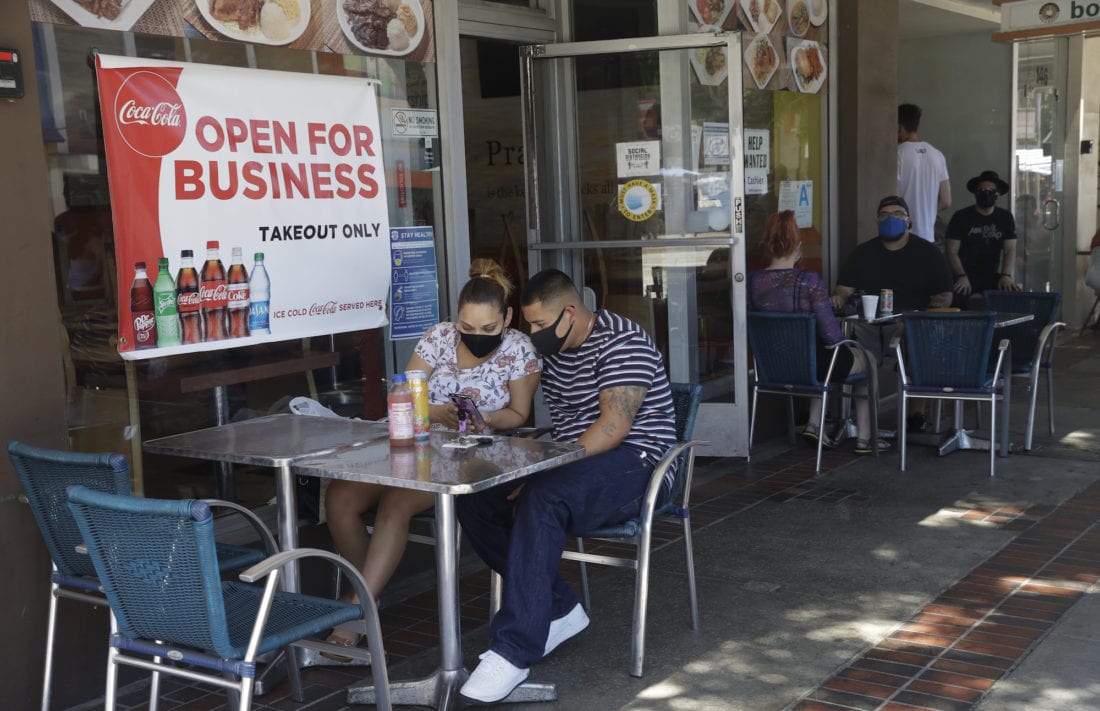
Restaurants will receive pandemic help through the California Rebuilding Fund. AP Photo/Marcio Jose Sanchez
The Haas School of Business and Berkeley Law came together to play a critical role in developing the State of California’s new fund to support small businesses devastated by the coronavirus pandemic. The California Rebuilding Fund, a new public-private partnership operated by the Governor’s Office of Business and Economic Development (GO-Biz), uses government capital to attract private lenders to offer low-interest loans to small businesses—particularly the smallest firms and entrepreneurs from communities that have been historically disenfranchised. Professors Laura Tyson and Adair Morse contributed their finance and policy expertise to the innovative design of the fund. “The state put many groups together to try to get the best of the best ideas,” said Morse, the Soloman P. Lee Chair in Business Ethics. “We all came together to try to optimize a plan for the people of California.”
Researchers contributing to pandemic knowledge
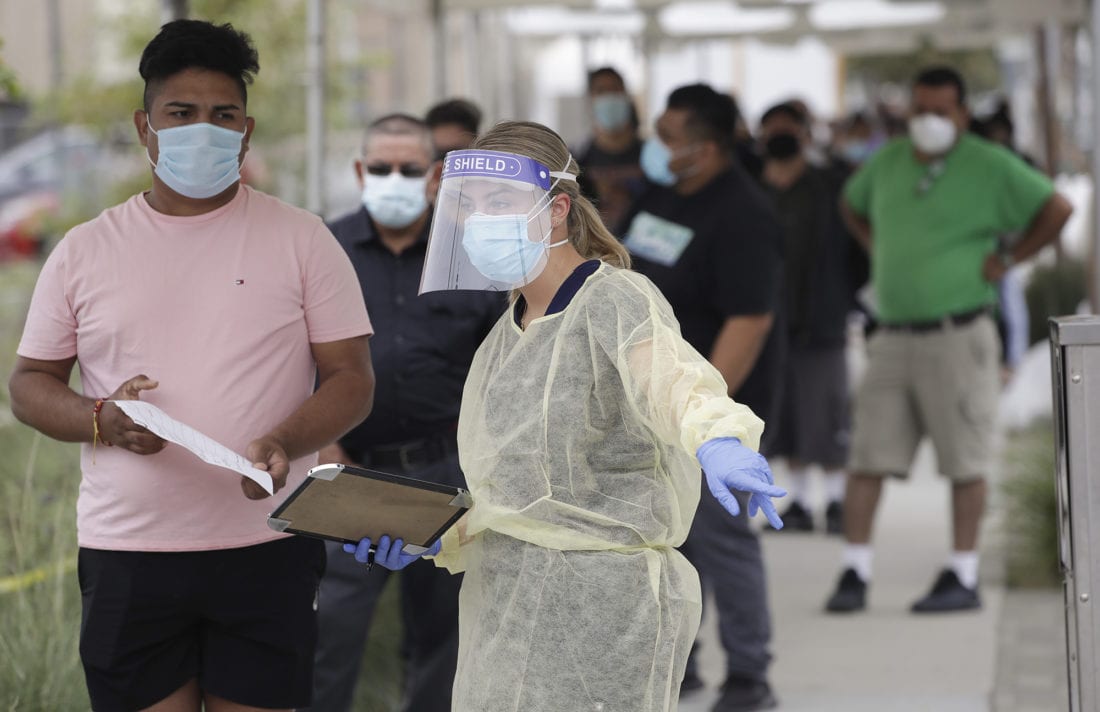
People line up behind a health care worker at a mobile coronavirus testing site in July at the Charles Drew University of Medicine and Science in Los Angeles. (AP Photo)
As the pandemic spread, many faculty members used their knowledge and research prowess to shed light on the growing crisis and to search for solutions. Associate professors Jonathan Kolstad and Ned Augenblick laid out a strategy for cheap, mass COVID-19 surveillance testing; Asst. Prof. Abhishek Nagaraj and a team of researchers across four universities built the interactive Reopen Mapping Project to show how different policies affect employment and the number of deaths from the virus; Prof. Pierre-Olivier Gourinchas examined which government policies were most effective in staving off small business bankruptcies in Europe; while Assoc. Prof. Luyi Yang analyzed the optimal way to prioritize who gets COVID tests. Many others generously shared their expertise with the media, wrote commentaries and op-eds, participated in panels and the “New Thinking in a Pandemic” series, and gave lessons on leading through crises for a Berkeley Executive Education video series.
New leaders and faculty

Nine new professors join Berkeley Haas faculty
Haas had a banner year for welcoming new leaders to the Dean’s suite, including Loretta Ezeife, chief financial officer; Howie Avery, assistant dean for Development & Alumni Relations; Michele de Nevers, in the newly-created position of executive director of sustainability programs, and Michelle Marquez, assistant dean of Human Resources. On the faculty side, nine new professors, including five women, joined Haas. The diverse, international group hails from Italy, Argentina, France, China, Canada, and California.
Pride in our big wins

Collin Morikawa holds the Wanamaker Trophy after winning the PGA Championship golf tournament on Aug. 9, 2020, in San Francisco. (AP Photo/Jeff Chiu)
Alum Collin Morikawa, BS 19, stunned the golf world last August by winning the PGA Championship, making history as one of the tournament’s youngest winners. Highlights from our many student competitions this year include a FTMBA team win at the Berkeley Haas Spring 2020 Tech Challenge, and a first-place FTMBA finish at the inaugural Oxford Global Private Equity Challenge in March. Yashoraj Tyagi and Akshay Gupta, both MFE 20, took first-place wins in the Moody’s Analytics competition. And another team of MFE students won first place in the Citadel West Coast Datathon. Eugene Kim, Zhuoran Li, Zixuan Chen, and Chen Su, all EWMBA 23, won the inaugural John E. Martin Healthcare Tech Challenge.
Alumni and faculty also netted academic honors, including Matteo Maggiori, PhD 12, who won the Fischer Black Prize—joining previous winner Prof. Ulrike Malmendier as a recipient of the prestigious award for the top finance scholar under age 40. Prof. Martin Lettau won the 2019 Roger F. Murray Prize for outstanding research from The Institute for Quantitative Research in Finance (The Q Group). Prof. David Teece was inducted into the Thinkers50 Hall of Fame, joining management greats Peter Drucker, Clay Christenson, Michael Porter, and his long-time collaborator Ikujiro Nonaka, PhD 82; Teece was also recognized as the top-cited scholar in the field of business and management, while Prof. Ross Levine was No. 10 for economics. Asst. Prof. Ellen Evers of the Haas Marketing Group was recognized with the Carol D. Soc Distinguished Graduate Student Mentoring Award, UC Berkeley’s premier award for graduate mentorship. Prof. Annette Vissing-Jørgensen was honored by the Swiss Finance Institute with its Outstanding Paper Award 2019 for “The Impact of Pensions and Insurance on Global Yield Curves”.
Rankings recognition
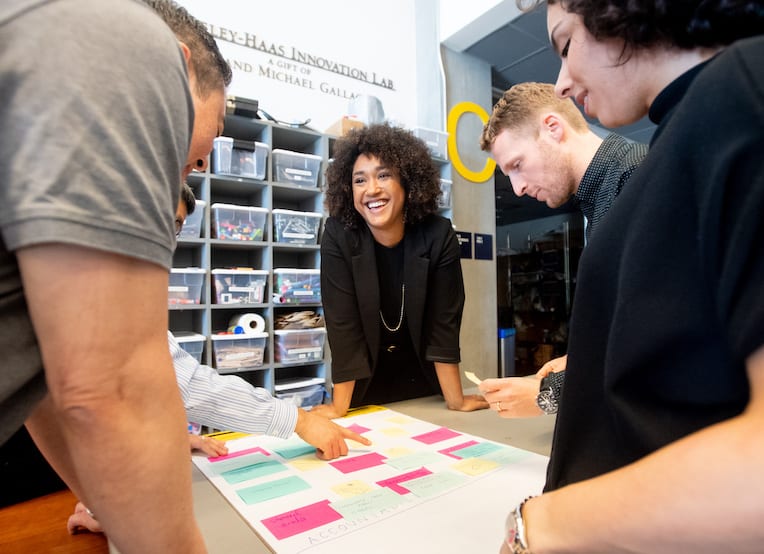
EMBA class of 2020 students in Teams@Haas class. Photo: Noah Berger
All of our degree programs again ranked in the Top 10 this year. The EWMBA Program ranked #2 and the Full-time MBA Program ranked #7 in U.S. News & World Report’s 2021 Best Business Schools; U.S. News ranked the Undergraduate Program #3. The Executive MBA Program (EMBA) was #1 in the world, according to The Economist; and the Master of Financial Engineering (MFE) Program placed #1 in the TFE Times ranking. Haas continued to climb in the Corporate Knights Better World Ranking, ranking among the very top U.S. business schools for incorporating sustainability into its research and teaching.
Posted in:
Topics:
